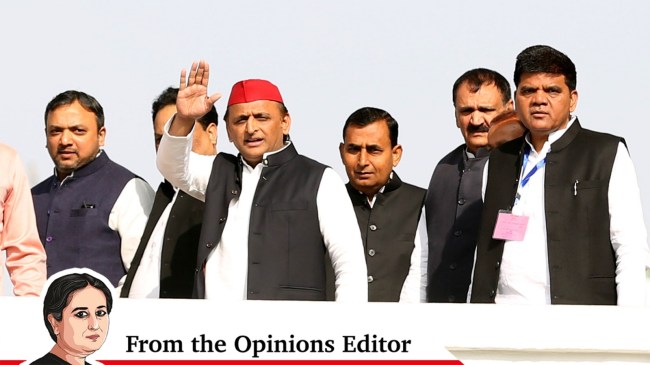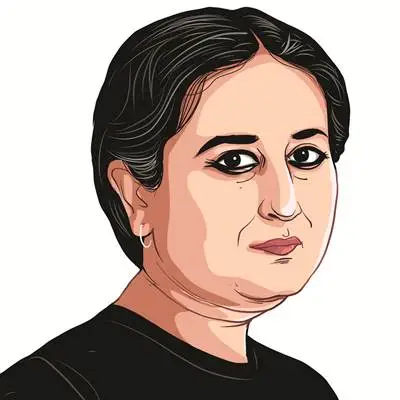Opinion Vandita Mishra writes: The Rajya Sabha cross-voting scandal that wasn’t
MLAs voted against their own parties. Why it is seen as politics-as-usual
 Samajwadi Party chief Akhilesh Yadav on his way to vote in the recently held Rajya Sabha elections. (Express file photo by Vishal Srivastava)
Samajwadi Party chief Akhilesh Yadav on his way to vote in the recently held Rajya Sabha elections. (Express file photo by Vishal Srivastava) Dear Express Reader
The Rajya Sabha elections last week, starring cross-voting legislators, ended with the BJP winning more seats than its tally of MLAs assured it of, and left a Congress government pushed to the brink.
The election pointed to some tawdry and sobering things.
To begin with, there is the palpable lack of scandal about the unbecoming to-ing and fro-ing by politically promiscuous MLAs and the fact that, across states, from UP to Himachal Pradesh, they seem headed overwhelmingly in the same direction — from non-BJP parties to the BJP.
This lack of scandal can be explained partly by cynicism bred by the smudged record of Rajya Sabha polls in terms of the role of money power in deciding who wins and who loses. And partly by the political reality in most states, which frames a curious paradox — increasing polarisation at the top of the political contest, even as cross-overs of workers and leaders from one party to another are seen as almost unremarkable and routine at ground level. There is no clear evidence to suggest that turncoats and defectors are punished by the voters.
There could be many reasons for the apparent impunity with which politicians switch sides, and the persisting fuzziness of party lines on the ground in the age of polarisation. An answer could lie in the all-round weakening of party structures and solidarities at constituency level, and in the growing personalisation of politics from the bottom of parties to their top. It could also be a spin-off of a closed and incestuous polity where the high barriers to entry discourage newcomers, and intensify the competition within a narrow field.
The lack of scandal is captured in popular euphemisms like “Operation Lotus”. The invocation of a flower that is also the BJP’s poll symbol, the suggestion of colour and fragrance, do not indicate at all the nasty and brutish politics that lies at the Operation’s heart — the luring and buying of MLAs, the splitting of Opposition parties, the felling of non-BJP governments with a mix of fear and favour, carrot and stick and weaponisation of central agencies.
While the RS polls may be located in the context of a general degradation of politics and lowering of voters’ expectations, and in the pursuit of victory, at any cost, by the BJP, they also say unflattering things about the BJP’s political rivals and opponents, conspiring in their own weakening.
The Congress’s harakiri is in the spotlight, but not so much that of the SP, the other big loser in these RS polls — seven of its MLAs cross-voted in the BJP’s favour in Uttar Pradesh, leading to the defeat of one of the three SP candidates.
Beyond the immediate reasons that may have become the trigger — which vary from a mutiny by its upper caste MLAs, to discontent among its leaders, including those who belong to the backward castes, over the party high command’s selection of RS candidates — lie larger syndromes.
As the main Opposition party in India’s politically most crucial state — the BSP is practically inactive and Congress still hasn’t found its feet in UP — the SP faces a three-pronged challenge.
The first SP problem is of its own making — the party that Mulayam Singh Yadav built seems to be flailing for stability, purpose and direction under the leadership of his son, Akhilesh. Family feuds have combined with Akhilesh’s more distant and less engaged leadership style to create a gap that is stark and widening.
Under Netaji, who was accessible to party leaders and workers and who, it is said, knew people by their names in every district and village, the SP led popular mobilisations when it was not in power that made the government of the day wary. Under Akhilesh, who inherited the party, didn’t build it, and who surrounds himself with a many-layered coterie, the SP seldom takes to the street.
Of course, and this is the second prong of the challenge for the Akhilesh-led SP, for the most part, Netaji did not have to do battle with an opponent like the Yogi Adityanath government. The Yogi government in UP has earned itself a formidable reputation for criminalising public protest. It is known to weaponise stringent laws and manipulate legal grey areas and bring out the bulldozer in the process. Playing Opposition to a government that shows no compunction in cracking down on dissent, in order to crush it and send out a chilling message, cannot be easy.
The third crisis that the SP faces today is the one posed by its inability to counter Hindutva politics. Its socialist legacy and its claims to secularism are proving to be an inadequate weapon, or shield, against the incursions of a BJP that deftly and aggressively combines Mandal and Welfare with Mandir.
It is in the context of these larger predicaments, then, that we need to locate last week’s dismal tableau of the SP’s cross-voting MLAs — and the ripples that it is not making.
Till next week,
Vandita




